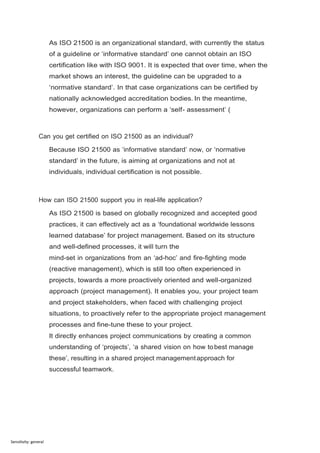As ISO 21500 is an organizational standard.pdf
- 1. Sensitivity: general As ISO 21500 is an organizational standard, with currently the status of a guideline or ŌĆśinformative standardŌĆÖ one cannot obtain an ISO certification like with ISO 9001. It is expected that over time, when the market shows an interest, the guideline can be upgraded to a ŌĆśnormative standardŌĆÖ. In that case organizations can be certified by nationally acknowledged accreditation bodies. In the meantime, however, organizations can perform a ŌĆśself- assessmentŌĆÖ ( Can you get certified on ISO 21500 as an individual? Because ISO 21500 as ŌĆśinformative standardŌĆÖ now, or ŌĆśnormative standardŌĆÖ in the future, is aiming at organizations and not at individuals, individual certification is not possible. How can ISO 21500 support you in real-life application? As ISO 21500 is based on globally recognized and accepted good practices, it can effectively act as a ŌĆśfoundational worldwide lessons learned databaseŌĆÖ for project management. Based on its structure and well-defined processes, it will turn the mind-set in organizations from an ŌĆśad-hocŌĆÖ and fire-fighting mode (reactive management), which is still too often experienced in projects, towards a more proactively oriented and well-organized approach (project management). It enables you, your project team and project stakeholders, when faced with challenging project situations, to proactively refer to the appropriate project management processes and fine-tune these to your project. It directly enhances project communications by creating a common understanding of ŌĆśprojectsŌĆÖ, ŌĆśa shared vision on how tobest manage theseŌĆÖ, resulting in a shared project managementapproach for successful teamwork.

